
THe format and style of Letters for Academic Purpose is explained. The quiz and assignment is provided.
- Subject:
- Arts and Humanities
- Material Type:
- Lesson
- Author:
- Archana Srinath
- Date Added:
- 09/11/2020

THe format and style of Letters for Academic Purpose is explained. The quiz and assignment is provided.

A responsive support team ready to assist you day and nightMoreover, we have a friendly and professional support team available 24/7 and ready to help you with any issue and answer your questions about ordering and writing process. You can reach them at any time of day and night, and they will solve all of your problems immediately. There are several ways to get in touch with our customer support department, including a phone call, email, and live chat.In other words, we offer you a combination of high quality writing, customer satisfaction, deep expertise and a chance to improve your grades without applying undue exertion. Our customers are students who value their time and aim to improve their academic performance with professional academic assistance of the most qualified writers in the industry. The time has come to become one of them. We are here to take your academic stress away. Trust our professionalism and get the best academic writing help from Essayruler.
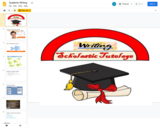
This course explains the various styles of research writing, its content and citation

This guide may be helpful for students who are preparing their doctoral theses.
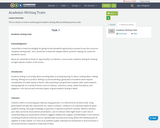
This is a lesson on how to achieve good academic writing skills by following various traits

Acceso is a complete, interactive curriculum for intermediate-level learners of Spanish. The materials on the site are provided freely to the public and are intended as a replacement for commercial textbooks, which are generally ill-suited to the learning outcomes now considered crucial to successful language study. These materials are supplemented by an online workbook built on the MySpanishLab platform of Pearson Education, Inc., as well as detailed lesson plans, rubrics for the evaluation of student work, and reliable instruments for measuring student progress and learning outcomes. Winner of 2012 Computer Assisted Language Consortium (CALICO) Focus Award
Reviews
CALICO Journal 29.2 (Jan 2012): 398-405.
Hispania 95.2 (June 2012): 365-366
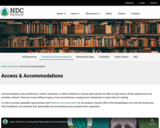
Accommodations are provided by a school, employer, or other institution to ensure deaf people are able to fully access all the experiences and activities offered. There are many different types of accommodations, ranging from interpreters to extra time for testing.
In order to ensure equitable opportunities and effective communication for all students, Section 504 of the Rehabilitation Act and the Americans with Disabilities Act mandate that reasonable accommodations be provided when requested.
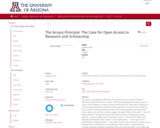
Questions about access to scholarship go back farther than recent debates over subscription prices, rights, and electronic archives suggest. The great libraries of the past—from the fabled collection at Alexandria to the early public libraries of nineteenth-century America—stood as arguments for increasing access. In The Access Principle, John Willinsky describes the latest chapter in this ongoing story—online open access publishing by scholarly journals—and makes a case for open access as a public good.
A commitment to scholarly work, writes Willinsky, carries with it a responsibility to circulate that work as widely as possible: this is the access principle. In the digital age, that responsibility includes exploring new publishing technologies and economic models to improve access to scholarly work. Wide circulation adds value to published work; it is a significant aspect of its claim to be knowledge. The right to know and the right to be known are inextricably mixed. Open access, argues Willinsky, can benefit both a researcher-author working at the best-equipped lab at a leading research university and a teacher struggling to find resources in an impoverished high school.
Willinsky describes different types of access—the New England Journal of Medicine, for example, grants open access to issues six months after initial publication, and First Monday forgoes a print edition and makes its contents immediately accessible at no cost. He discusses the contradictions of copyright law, the reading of research, and the economic viability of open access. He also considers broader themes of public access to knowledge, human rights issues, lessons from publishing history, and "epistemological vanities." The debate over open access, writes Willinsky, raises crucial questions about the place of scholarly work in a larger world—and about the future of knowledge.

On completion of this unit participants should:
Investigate and source digital versions of the Zambian curricula documents.
Determine what role for ICT has been envisaged by the national education authority as expressed within the official curriculum
Identify sixteen 21st century skills as defined by the World Economic Forum
Integrate at least two 21st century skills into their teaching and learning.

Join us for an insightful session on accessibility supports available on the Oregon Statewide Assessments. We will review 2022-23 assessment data, explore commonly used supports, and discuss integrating them into everyday instruction. Learn how to prepare students for success on statewide assessments and gain valuable insights into the accessibility process at the Oregon Department of Education (ODE). Join us to empower your students and enhance their assessment experiences!
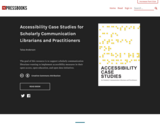
The goal of this resource is to support scholarly communication librarians wanting to implement accessibility measures in their open access, open education, and open data initiatives.

Classification of Analytical Methods
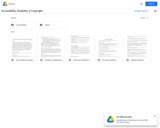
These materials are intended to be used both in graduate courses related to copyright or accessibility and by practitioners interested in learning more on the topic. Topics covered include the Chafee Amendment and how it has changed post-Marrakesh Treaty, the role of accessibility in the Authors Guild, Inc. v. HathiTrust decision, the importance of the Marrakesh Treaty for international efforts to make materials accessible across borders, and how licensing provisions can impact these various rights. The resources include videos explaining the key points of each topic, along with editable slide decks for those who wish to build on the existing materials, activities and options for assignments, recommended pre-class readings, discussion prompts, and related resources for those who want to learn more on the topics introduced in this OER module. There are also teaching notes for those interested in using the module in a class they are teaching.

Join Aujalee Moore (ODE), Debra Fitzgibbons (OTAP), Linda Brown (ODE), and Michael Cantino (BVIS) for shared learning about accessibility and instructional materials in Oregon K-12 schools.
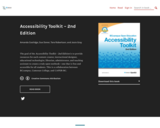
Short Description:
The goal of the Accessibility Toolkit - 2nd Edition is to provide resources for each content creator, instructional designer, educational technologist, librarian, administrator, and teaching assistant to create a truly open textbook—one that is free and accessible for all students. This is a collaboration between BCcampus, Camosun College, and CAPER-BC.
Long Description:
The goal of the Accessibility Toolkit – 2nd Edition is to provide resources for each content creator, instructional designer, educational technologist, librarian, administrator, and teaching assistant to create a truly open textbook—one that is free and accessible for all students.
This second edition has built upon, and improved, the original toolkit—a collaboration between BCcampus, Camosun College, and CAPER-BC—with a new “Accessibility Statements” chapter, bibliography and list of links by chapter for print users in the back matter, updated information, and corrections to content, style and layout.
The French translation of the first edition of the Accessibility Toolkit—La Trousse d’outils d’accessibilité —is still available. In time, a French translation of this second edition will be made available.
Word Count: 14908
ISBN: 978-1-77420-030-8
(Note: This resource's metadata has been created automatically by reformatting and/or combining the information that the author initially provided as part of a bulk import process.)

In this section, you and your team will engage in a Landscape Analysis to uncover key structures and supports that can guide your work to support Accessibility in OER. You may or may not answer all of these questions, but this is an offering.
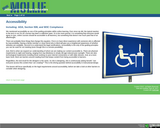
Accessibility in Online Learning
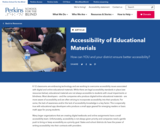
K-12 classrooms are embracing technology and are working to overcome accessibility issues associated with digital and online educational materials. While there are legal accessibility standards in place (see resources below), educational materials are not always accessible to students with visual impairments or blindness. Most developers – and the companies who produce digital/online educational materials – are more aware of accessibility and are often striving to incorporate accessibility into their products. For some, the lack of awareness and/or the lack of accessibility knowledge is a key factor. This is especially true with educational app developers who produce a small apps geared for emerging readers or basic math apps for young students.
Many larger organizations that are creating digital textbooks and online assignments have a small accessibility team. Unfortunately, accessibility is not always given priority and companies need a gentle push to bring or keep accessibility as a priority goal. States and school districts do have the power of writing accessibility into their contracts with providers.

Think about the diverse learners in your classroom. How do we engage ALL learners in the curriculum content? In the Accessible Content for All modules, you will learn about Accessible Educational Material (AEM) and tech tools that are hidden in plain sight in your schools. You will hear teacher accounts of using tools like read-aloud, closed captioning, and translation to increase student engagement. These modules are self-paced and cover ways to create accessibility within Google, Microsoft, and IOS. Peruse the modules and explore the topics you want to learn more about. Create your own learning journey toward building accessibility, equity, and engagement in your classroom.
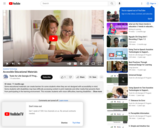
Some educational materials can create barriers for some students when they are not designed with accessibility in mind. Some students with disabilities may h...